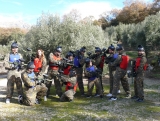Depending on the type of skier you are, you'll need to pay more or less attention to your diet. That is to say, it's not the same for someone who goes full throttle on the slopes all day as for someone who takes it easy and prefers to go at a gentler pace. But the basics of a skier's diet are as follows.

1. Pay special attention to carbohydrates
This is essential, as they're what keep glycogen levels high and help us maintain energy for this activity. For this, consider foods like pasta, potatoes or rice, and be sure to combine them with lean proteins like chicken or turkey. Don't forget vegetables and fruits to round out your diet.

2. Breakfast plays a key role
Don't forget to properly fuel up with your first meal of the day. It's important to include carbs like cereals, toast, wholemeal bread or biscuits; pair them with proteins from milk, cheese, cured ham...; fats like butter or nuts; and vitamins from fruits or juices (preferably natural ones where possible).

3. Don't forget a snack
It's important that no more than 3 hours pass between meals (ideally you should eat 5 times a day), so remember to stash energy bars, natural nuts or a piece of fruit like bananas in your pocket.

4. Lunchtime arrives
Don't forget to eat pasta, meat, pizza, soup, chicken or vegetables. Depending on what kind of skier you are, as mentioned earlier, this will vary. If you're a hardcore skier with no time to lose, it's advisable to eat something light like a sandwich or a tapa and something warm like soup.

If you're someone who prefers to give it your all in the morning, opt for a more substantial lunch – something warm and as hearty as you like, so you can sunbathe on the slopes and ski down at your leisure...
5. For dinner...
It's essential not to leave too much time between finishing your sport and having dinner, so it's advisable to have a late-afternoon meal/dinner that includes mineral salts and liquids (from broths and soups), carbohydrates, vitamins, proteins and minerals.

6. Stay hydrated
Even if you feel like you're in the snow, that it's not hot or you're not thirsty, it's very important to drink plenty, as sweating during physical exercise promotes dehydration. The ideal is to drink fluids every 20-30 minutes – water, herbal teas or even isotonic drinks.

7. Avoid alcohol and caffeine
Believe it or not, drinking alcohol on the ski slopes, given the altitude, means it's processed faster and could affect your ability to manoeuvre during descents.

If you drink coffee, make it decaf, as caffeine is a diuretic and will make you need the loo more often, leading to fluid loss.












